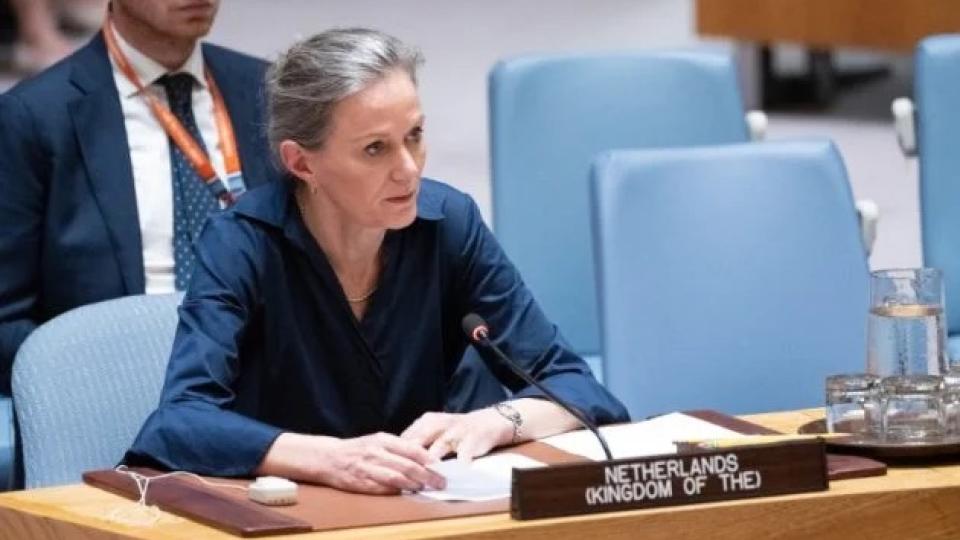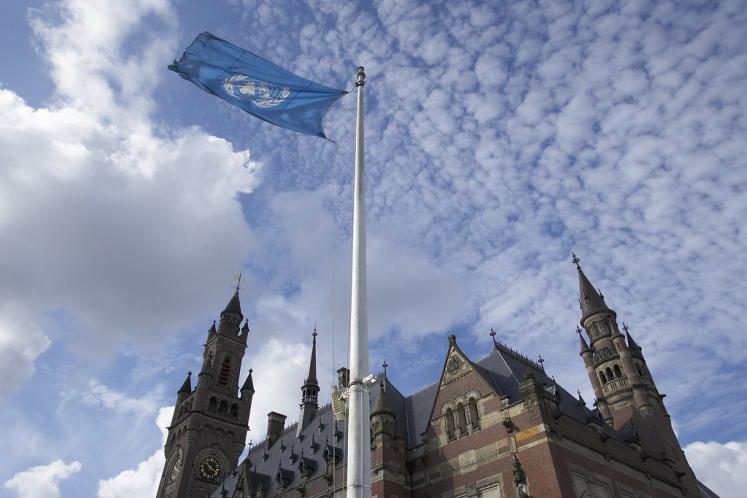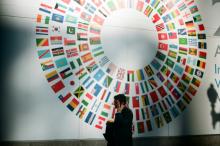The Kingdom of the Netherlands, comprising the four autonomous countries of the Netherlands, Aruba, Curaçao, and Sint Maarten, forms a single UN Member State and, as one of the UN’s founding members, it is a strong advocate of effective multilateralism and the universal values of the UN Charter.
“Today’s problems, such as climate change and security, are so complex that they can only be addressed through cooperation”, Lise Gregoire-van Haaren, the Permanent Representative of the Kingdom of the Netherlands to the United Nations in New York explained.
The Kingdom of the Netherlands positions itself at the UN as a strong partner for peace, justice and development and a staunch defender of human rights and fundamental freedoms, including freedoms of religion, belief, and expression.
“We’re known for our commitment to international law, in part because the Netherlands is the host country of the International Court of Justice and the International Criminal Court”, the Kingdom’s Permanent Representative to the UN Lise Gregoire-van Haaren emphasised. “We believe it’s important not only to make international agreements but also to abide by them.”
The Kingdom of the Netherlands served six times as a non-permanent member on the UN Security Council: 1946, 1951-52, 1965-66, 1983-84, 1999-2000, and 2018. It is a candidate for the UN Security Council for the 2033-34 term.

The Netherlands is home to the headquarters of several United Nations entities
The International Court of Justice (ICJ), based in The Hague, is the principal judicial organ of the United Nations and the only principal UN organ located outside New York. Housed in the Peace Palace, a monument inaugurated in 1913 to open the Permanent Court of Arbitration. The ICJ deals exclusively with legal disputes between States, and gives advisory opinions to the UN General Assembly and Security Council and other UN organs and specialised agencies upon request.
“Working in the most iconic building of The Hague and the global symbol of international justice is truly a privilege, especially for someone with a background in international law, like myself”, says Monique Legerman, Head of the ICJ’s Information Department. “Even after 15 years spent on the premises, I do not take it for granted.”
Also located in The Hague is the International Criminal Court (ICC), an independent judicial body with jurisdiction to try individuals accused of genocide, crimes against humanity and war crimes. The ICC is governed by the Rome Statute, which was negotiated within the UN, ratified by 125 states and entered into force in 2002.
About 450 international civil servants are part of the UN workforce in The Hague, including the International Residual Mechanism for Criminal Tribunals (IRMCT), the Organisation for the Prohibition of Chemical Weapons (OPCW), and the Centre for Artificial Intelligence and Robotics of the United Nations Interregional Crime and Justice Research Institute (UNICRI).
The United Nations University in Maastricht
The United Nations University is active in Maastricht with its Institute for Economic and Social Research on Innovation and Technology (UNU-MERIT). With 60 PhD students and 90 Master’s students of various nationalities, UNU-MERIT combines research with practical application in public policy, aiming for sustainable development and a more inclusive future.
“Working in Maastricht is a reminder of what is possible when multilateral principles are upheld,” says Diego Salama, Head of Partnerships and Communications at UNU-MERIT.
“From the city where a united Europe took shape, I now work at the frontline of global research and education in service of the United Nations. In an age of uncertainty, I believe we need institutions that don’t just generate knowledge—but translate it into impact. It is a daily exercise in hope: that facts still matter, that ideas can still unite us, and that evidence-based thinking can still light the way forward in international cooperation.”
The Kingdom of the Netherlands in the UN system
A total of 725 Dutch nationals work for the UN (131,000 people in total) worldwide.
Several women stand out. Queen Máxima served as the UN Secretary-General’s Special Advocate for Inclusive Finance for Development from 2009 to 2024 and was appointed Special Advocate for Financial Health in September 2024. Former Deputy Prime Minister and Foreign Minister Sigrid Kaag has held several senior UN roles focused on diplomacy and crisis response in the Middle East. Jeanine Hennis-Plasschaert, former Minister of Defence, was UN Special Representative for Iraq from 2018 to 2024 and became Special Coordinator for Lebanon in May 2024. Other Dutch representatives include Judge Liesbeth Lijnzaad of the International Tribunal for the Law of the Sea, Yvonne Donders of the UN Human Rights Committee, and Corinne Dettmeijer Vermeulen of the Committee on the Elimination of Discrimination against Women.
The Netherlands hosts 13 sites listed as UNESCO World Heritage Sites, which contributes to the country’s appeal as a tourist destination. These include the 17th-century concentric canal system within the Singelgracht in Amsterdam and the network of windmills in Kinderdijk-Elshout.
Major contributor to the United Nations
The contribution of the Kingdom of the Netherlands to the regular budget of the United Nations Secretariat amounts to 44.5 million dollars (USD) in 2025, or 1.20% of the total (3.72 billion USD). The regular budget consists of mandatory contributions from UN Member States. Other financial support comes in the form of voluntary contributions.
In 2024, the Kingdom of the Netherlands allocated 590.7 million USD to humanitarian aid, including 180.3 million USD for UN agencies. According to OCHA, these included the International Labour Organisation (ILO, 69.7 million USD in Dutch funding), the World Health Organisation (WHO, 27 million), the World Food Programme (20.2 million) and UNICEF (15.9 million).
The Kingdom of the Netherlands was also the fifth largest contributor to the United Nations Development Programme (UNDP) in 2024, with a contribution of 42.14 million USD to regular resources, after Germany, the United States, Japan and Switzerland. For the period 2023-25, the Kingdom of the Netherlands has pledged to contribute 103 million euros to the UNDP. The Kingdom is also the ninth largest contributor to the High Commissioner for Refugees (UNHCR), with nearly 80 million USD in 2024.
In February, the Dutch government announced budget cuts of 2.4 billion euros in development aid from 2027 onwards. New parliamentary elections are scheduled for October 2025, after which a new government will be formed. Its decisions in this area are to be observed.
A global supplier to the United Nations
The Kingdom of the Netherlands is also the 15th largest supplier to the UN. In 2024, the Dutch private sector received 480.8 million USD in orders from the UN (1.9% of the organisation’s total global purchases). These purchases mainly concern pharmaceuticals and medical equipment and supplies, according to the United Nations Global Marketplace (UNGM).
The Kingdom of the Netherlands’ leadership in supporting multilateralism remains vital in the current geopolitical context, which requires even greater international cooperation and solidarity.
This article is republished from UNRIC under a Creative Commons license. Read the original article.
Suggested citation: "The Kingdom of the Netherlands and the UN: What you need to know," United Nations University, UNU-MERIT, 2025-08-21, https://unu.edu/merit/article/kingdom-netherlands-and-un-what-you-need-know.


